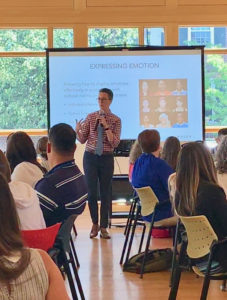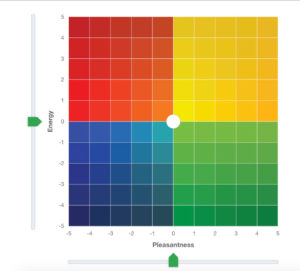By Tre Gabriel
Flawless Intern
This summer, Team Flawless was represented at the RULER Institute for a training called, “Creating Emotionally Intelligent Schools.” This highly interactive training provided administrators, teachers, and staff for grades pre-K through 12 with an introduction to skills to develop their own emotional skills as well as tools to implement the RULER Approach in schools around the country. Participants left prepared to practice what they learned and to create pathways to train fellow educators and staff back home in RULER skills and tools to implement the RULER Approach in the classroom.
The lead trainer was proud Bronx native Dena Simmons, Assistant Director of the Yale Center for Emotional Intelligence. Simmons created an energetic tone that was shared by her fellow trainers: Sarah Free, Sarah Kadden, and Daphnee Nicolas and center associate director, Robin Stern. Robin and Sarah Kadden’s clinical background paired with Sarah and Daphnee’s training and experience as educators, they each brought their own expertise to the training. These inspiring instructors were educators, program managers, and professional development trainers who have taught in some of our country’s most at-risk schools.
The training was pointedly interactive in its approach. The first lesson was a reflective activity, where attendees were asked to think deeply about a child in their lives with challenging behaviors. But rather than focus on all of the challenges, we were invited to think about all the things that we didn’t know about that child. Does that child have their own bed at home? Is their commute to school dangerous? Do they eat before coming into school? We considered how we really don’t know what happened to a child 20 minutes—let alone 24 hours—before they come into our presence. The purpose of this exercise was to promote empathy not only for the children we teach, but, for all of us ‘having a day’, and to raise awareness about how little most of us know about our students’ lives outside of school and their roller coaster of emotions.
We were also introduced to the mood meter, our signature tool for building self and social awareness and allowing adults and students to track their emotional patterns, build emotion vocabulary and learn strategies to shift from one mood state to another. It is a powerful tool to help us learn not only to recognize emotional states in ourselves but also in others while also helping to develop strategies for managing emotions. It helps us to develop the five RULER skills: Recognizing, Understanding, Labeling, Expressing, and Regulating emotions.
The mood meter is color-coded in a way that corresponds to levels and pleasantness and energy – 2 dimensions found in all emotions.. If you are experiencing very intense and unpleasant emotions (such as anger and frustration), you are in the red quadrant. If you are experiencing pleasurably intense emotions (such as excitement, joy, and confidence) you are in the yellow quadrant. If your unpleasant emotions are accompanied by low energy (such as boredom or depression) you are in the blue quadrant. And finally, if you have an emotion that makes you feel pleasantly mellow (such as serenity or satisfaction), you are in the green quadrant. The mood meter is appealing for kids and adults alike – and, appears to be less intimidating to ‘plot’ your emotion on a visual space then to directly answer the question “how are you feeling”.
At Yale, emotional intelligence is defined as the knowledge and skills related to the five skills of RULER. When you recognize, you are identifying emotions in yourself by paying attention to your own physiology, your thoughts, your facial expression, your body and your vocal tones. When recognizing others’ emotions, pay attention to facial expressions, vocal tones, body language, and general behavior. Understanding means helping makes sense of why you are experiencing your emotions — of the causes and context of these emotions, and identifying the consequences for you, of experiencing emotions. . By labeling, you are “naming it to tame it” -developing a wider range, a more nuanced, vocabulary to accurately describe your emotions. Learning how to express emotions to the right degree, to the right person, in a helpful way is an effective way to communicate your feelings – essential for communication. Participants learned that our comfort level with emotions, context and social norms all influence our expressing emotions. And lastly, regulating emotions – the master skills – prevents us from acting impulsively on our emotions, while developing helpful strategies for managing all emotions .
But why do all this? After implementing the RULER in schools, students have been shown to be less anxious and depressed and more attentive, with improved academic performance. And – students who are skilled in emotional intelligence have greater well-being and higher self esteem. It looks like all schools need to bring this to their students, as we know from recent research at YCEI, our High Schools students across the country report their top feelings at school are tired, stressed, and bored.
This approach is an exciting paradigm shift. I feel, without a doubt, that it will drastically improve student performance and happiness at school. I feel this way not only because of the quality of material, but largely because of the manner in which it was presented and the opportunity for participants to work ‘hands on’ with the material.. The administrators, teachers, and staff in attendance were constantly on their feet and working together, whether in role playing, dancing, skits, or just to practice the breathing techniques. I will definitely recommend this wonderful training to other instructors. If you are an educator who wants to make a difference in your school, check out future training opportunities here!









